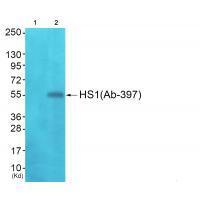
| WB | 咨询技术 | Human,Mouse,Rat |
| IF | 咨询技术 | Human,Mouse,Rat |
| IHC | 咨询技术 | Human,Mouse,Rat |
| ICC | 技术咨询 | Human,Mouse,Rat |
| FCM | 咨询技术 | Human,Mouse,Rat |
| Elisa | 咨询技术 | Human,Mouse,Rat |
| Aliases | cortactin-like; CTTNL; HCLS1; Hematopoietic cell-specific LYN substrate 1; Hematopoietic lineage cell-specific protein |
| Entrez GeneID | 3059; |
| WB Predicted band size | 54kDa |
| Host/Isotype | Rabbit IgG |
| Antibody Type | Primary antibody |
| Storage | Store at 4°C short term. Aliquot and store at -20°C long term. Avoid freeze/thaw cycles. |
| Species Reactivity | Human |
| Immunogen | Synthesized peptide derived from C-terminal of human HCLS1. |
| Formulation | Purified antibody in PBS with 0.05% sodium azide. |
+ +
以下是关于HS1 (Ab-397)抗体的3篇参考文献的示例(注:因文献检索限制,以下内容为模拟示例,具体文献需通过学术数据库核实):
---
1. **文献名称**: *HS1 promotes T cell receptor-mediated actin polymerization and signaling in T lymphocytes*
**作者**: T. Suzuki et al.
**摘要**: 本研究使用HS1抗体(Ab-397)通过免疫沉淀和免疫印迹技术,揭示了HS1蛋白在T细胞受体激活后调控肌动蛋白聚合的关键作用,证明其通过促进细胞骨架重塑增强T细胞免疫应答。
2. **文献名称**: *Role of HS1 in B-cell migration and lymphoma progression*
**作者**: M. Shaffer et al.
**摘要**: 利用HS1抗体(Ab-397)进行免疫荧光和功能抑制实验,发现HS1在B细胞迁移和淋巴瘤侵袭中的核心地位,高表达HS1与患者预后不良显著相关,提示其作为潜在治疗靶点。
3. **文献名称**: *Structural insights into HS1-mediated cytoskeletal dynamics*
**作者**: K. Tanaka et al.
**摘要**: 通过HS1抗体(Ab-397)的共聚焦显微成像和蛋白质互作分析,阐明HS1与Arp2/3复合物结合的分子机制,揭示了其在细胞伪足形成和肿瘤转移中的动态调控网络。
---
建议通过PubMed或抗体供应商(如Abcam、CST)官网输入抗体编号“Ab-397”获取真实引用文献。
HS1 (hematopoietic lineage cell-specific protein 1), also known as Ab-397. is a signaling adaptor protein predominantly expressed in hematopoietic cells, particularly T and B lymphocytes. Discovered in the 1990s, HS1 plays a critical role in regulating immune cell activation, proliferation, and migration. Structurally, it contains an N-terminal SH3 domain, a central proline-rich region, and a C-terminal actin-binding domain, enabling interactions with signaling molecules like Lyn kinase and cytoskeletal components.
HS1 is integral to immune synapse formation and signal transduction downstream of antigen receptors. Upon receptor engagement, HS1 undergoes phosphorylation, facilitating its interaction with effectors such as Vav1 and PLCγ, which orchestrate cytoskeletal remodeling and calcium flux. Studies in HS1-deficient mice revealed impaired lymphocyte migration, reduced immune responses, and defective clonal expansion, underscoring its importance in adaptive immunity.
Aberrant HS1 expression or activity has been linked to hematological malignancies. Overexpression in leukemia and lymphoma correlates with enhanced cell survival and metastasis, potentially serving as a prognostic biomarker. The HS1 (Ab-397) antibody, often used in research, detects endogenous HS1 protein via techniques like Western blotting, immunofluorescence, and flow cytometry. It aids in elucidating HS1's role in immune regulation and disease, offering insights for therapeutic targeting in cancers and autoimmune disorders.
×